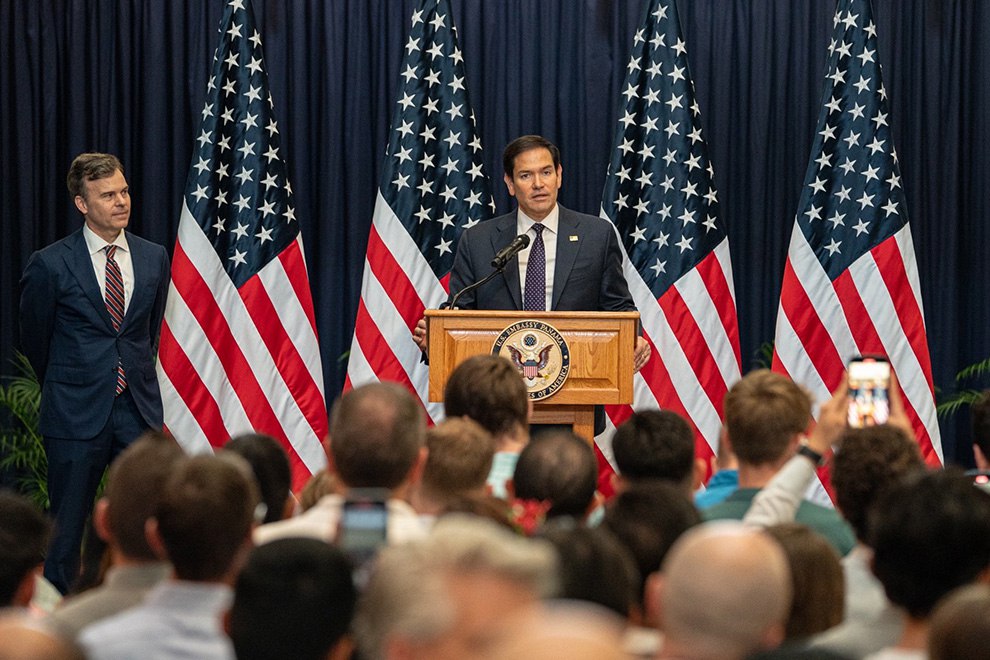Secretary of State Declares War on Bureaucratic Bloat, Closes Offices Used to Censor Americans
Secretary of State Marco Rubio unveiled a bold and sweeping reorganization of the U.S. State Department on Monday, promising to “bring the department into the 21st century” and put the interests of American citizens above the entanglements of globalist bureaucracy.
In a fiery statement, Rubio declared, “Under President Trump’s leadership and at my direction, we are reversing decades of bloat and bureaucracy at the State Department.”
From Bureaucracy to Boldness: The State Department Reimagined
Rubio’s announcement marks the most dramatic restructuring of Foggy Bottom in a generation. Citing spiraling costs and diminished effectiveness, he outlined a plan to eliminate redundant offices, consolidate region-specific functions, and terminate programs that no longer serve U.S. strategic interests.
“The Department is bloated, bureaucratic, and unable to perform its essential diplomatic mission,” Rubio said. “This reorganization will empower our diplomats to serve with clarity, direction, and purpose—and to serve America first.”
Ending the Censorship Machine: GEC Shuttered
Among the most high-profile changes is the dismantling of the Counter Foreign Information Manipulation and Interference Office—formerly known as the Global Engagement Center (GEC). This taxpayer-funded program, initially created to combat foreign disinformation, became notorious for coordinating with tech platforms to censor American citizens’ speech under the guise of combating “misinformation.”
Rubio made clear the office was beyond saving.
“When a government office created to fight foreign lies is instead used to silence its own citizens, it becomes a threat to liberty,” Rubio said last week. “That era is over.”
What Will Change Under Rubio’s Overhaul
-
Consolidation of Region-Specific Functions: Breaking down silos between overlapping diplomatic bureaus to streamline strategy and coordination.
-
Elimination of Redundancy: Offices with duplicative missions will be disbanded to cut costs and improve efficiency.
-
Termination of Non-Statutory Programs: Any initiative not mandated by Congress or aligned with America’s core interests will be cut.
-
Prioritization of National Sovereignty: American diplomats will no longer be distracted by globalist social engineering projects, but instead focus on advancing U.S. security, economic strength, and cultural values abroad.
A Foreign Policy Realignment
Rubio’s reorganization reflects a Trump-era foreign policy reset aimed at reclaiming U.S. sovereignty in global affairs. Where prior administrations emphasized multilateral consensus and “global citizenship,” the new doctrine unapologetically prioritizes American interests and values.
“This is about ending the era of State Department activism and replacing it with unapologetic American diplomacy,” Rubio said.
The sweeping changes are already being praised by conservative foreign policy experts, who have long warned that the U.S. diplomatic apparatus had grown too beholden to international think tanks, unelected NGOs, and ideological agendas unrelated to America’s national interest.
Conclusion: A New Era for U.S. Diplomacy
Rubio’s aggressive reforms signal that under President Trump’s second term, the State Department is no longer a haven for unelected bureaucrats and woke ideologues—it’s a mission-driven engine for advancing the cause of American greatness on the global stage.
As Rubio put it: “To make America great again, we must make diplomacy great again—and that starts today.”

